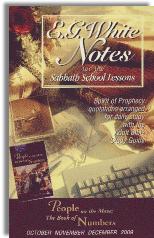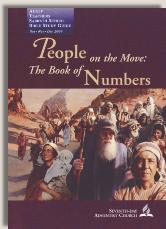|
||||||||||||||
Commentary on "Preparing a People"
Day 4: Tuesday, October 6, 2009
Overview
“However strange this whole thing seems to us today, the point it brings out is how important the marriage vow is in the eyes of God. Only God alone knows just how much pain, suffering, and damage has been caused by marital infidelity by one partner or another. What a tragedy that in so many societies marriage vows seem to hold about as much sanctity as a handshake.
What things can you do, what choices can you make, to enable you to have a pure heart?”
Problems
I am commenting on all three of these days (Sunday through Tuesday) at once because all of them use the same underlying approach – wrong suffered (whether disease, societal or marital), confession, restitution and restoration.
In many ways, these three parts of the lesson present much good history and interpretation. God created a nation from two million illiterate slaves. More than this, He preserved these slaves through the very worst Egypt could throw at them and through the very worst they could do to themselves after becoming a nation in order to bring Jesus to this world when the time had fully come (see Galatians 4:4-5).
As we read and understand Israel’s history there is little we can do other than fall on our faces before such a God. And to think this was just one part of His total plan!
However, while I appreciate the historical context provided by the author, I must explain the complete confusion between the Old and New Covenants inherent in all the application notes. In particular, all three sections come back to an idea of forgiveness that simply is not supported by the New Covenant.
I don’t have the space or time to give a full treatment, but the following outline will suffice.
“For if you forgive men when they sin against you, your heavenly Father will also forgive you. But if you do not forgive men their sins, your Father will not forgive your sins” (Matthew 6:14-15).
Jesus said this as part of what we call the Lord’s Prayer.
“Be kind and compassionate to one another, forgiving each other, just as in Christ God forgave you” (Ephesians 4:32). “Bear with each other and forgive whatever grievances you may have against one another. Forgive as the Lord forgave you” (Colossians 3:13).
Here we have two sets of verses that, apparently, are in direct conflict with each other. First, Jesus said that we could obtain forgiveness only if we forgave others. Second, Paul calls us to forgive others in the same way we already have been forgiven. Either Jesus was wrong, or Paul was wrong, or something changed.
Thankfully, something changed.
At the death of Jesus the Old (or Mosaic) Covenant was fulfilled and the New Covenant began. Jesus was born and taught under the Old. The entire Sermon on the Mount (Matthew 5-7) was a masterful exposition of what it meant to live under the Old.
Jesus was dealing with arrogant Pharisees and teachers of the Law who thought they were doing just fine, thank you. He also was dealing with common folks who saw those Pharisees and teachers of the Law as people who had “made it”, who had attained a standing with God the average Joe could only dream about. In short, they were reasonably hopeless and confused. The Sermon on the Mount ruined the self-righteousness of the Jewish leaders and confirmed the hopelessness of the common folk, while offering real hope to both of them.
Paul taught under the New Covenant. The key phrase of that covenant is: “Then he adds: ‘Their sins and lawless acts I will remember no more.’ And where these have been forgiven, there is no longer any sacrifice for sin” (Hebrews 10:17-18).
Under the New Covenant, God no longer remembers our sins and lawless acts. They are removed from His sight as far as the East is from the West. Where these are no longer remembered it means that we have been forgiven. The verse does not say, “We can be forgiven,” or, “We might be forgiven,” or, “We have a chance to be forgiven if we forgive our neighbors first.” No! Our sins have been forgiven!
And where they have been forgiven, there is no longer any sacrifice for sin. That is, if any more forgiveness, beyond what already has been provided, still needed to be offered, then Jesus would need to die again. He is not going to do that.
“Day after day every priest stands and performs his religious duties; again and again he offers the same sacrifices, which can never take away sins. But when this priest had offered for all time one sacrifice for sins, he sat down at the right hand of God. Since that time he waits for his enemies to be made his footstool, because by one sacrifice he has made perfect forever those who are being made holy” (Hebrews 10:11-14).
Therefore, what Jesus told his listeners as he taught on that hillside does not apply to us on this side of the Cross and Resurrection. What Paul wrote to the Ephesian and Colossian churches did not apply to those who lived before the Cross and Resurrection.
This brings us to 1 John 1:9 – the Christian “Bar of Soap”. To his or her credit, the author of this week’s lesson included Verse 8 in the comments. Here are both verses.
“If we claim to be without sin, we deceive ourselves and the truth is not in us. If we confess our sins, he is faithful and just and will forgive us our sins and purify us from all unrighteousness” (1 John 1:8-9).
First, John was writing to those who claim to be without sin. They (and we, if we maintain the same attitude) are deceived and the truth is not in them (or us). In others words, he was writing to lost people.
How do we know?
“The elder, To the chosen lady and her children, whom I love in the truth—and not I only, but also all who know the truth – because of the truth, which lives in us and will be with us forever…” (2 John 1:1-2).
There is a clear contrast in John’s letters between those who are saved (“because of the truth, which lives in us and will be with us forever”) and those who are lost (“the truth is not in us”).
Having the truth in you means no less than being indwelt by the Holy Spirit. (See John 14:6, John 17:17 and John 16:5-15.) Once indwelt by the Holy Spirit, always indwelt by the Holy Spirit, according to 2 John 1:2.
This misapplication of 1 John 1:9 has kept more Christians in bondage than any other verse in the Bible. If you already have admitted your guilt before God and turned from your unbelief (repentance), then you are a forgiven person. You received forgiveness as the direct result of being in Christ (see Ephesians 1:7-8). There is no more forgiveness to be obtained, and, as we saw above, there is no more forgiveness to be offered.
So what do we do when we sin (that is, when we do something, good or bad, in our own strength rather than walking by faith)? We say, “Thank you!”
Does this give us a license to sin? Of course not. Read Titus 2:11-14. The grace of God, that is, the Holy Spirit living within each of us, will lead us in the way we should go. We no longer need the Mosaic Covenant (especially the Ten Commandments), because we are no longer under Law but under grace.
Finally, note that Jesus also said we are to “love your neighbor as yourself.” This was in response to the question, “What is the great commandment?” Jesus quoted directly from Leviticus 19:18, another Old Covenant reference. This, too, was changed to, “Love each other as I have loved you” (John 15:12) by Jesus Himself.
All of the Old Covenant laws, sacrifices, ordinances, social compacts, etc. were used by God to create for Himself a unique people, a nation with a far better government and sense of purpose than any of the nations around them. As Paul said, the Law was holy, just and good, but if we take that covenant out of the context in which it was given we will be defeated because it no longer applies to us.
So, if you experience “the reality of how sin separates a person from the sense of God’s presence,” or “the sense of spiritual isolation that comes from being defiled before God,” then you have not really accepted what Jesus has accomplished for you. ALL condemnation comes from Satan, not God. Read Romans 8.
Summary
- Sunday’s, Monday’s and Tuesday’s sections contain much interesting and valuable historical information.
- The lesson’s failure is its attempt to mix the Old and New Covenants together as one and the same thing.
- This mixing is expressed particularly in a misunderstanding of forgiveness.
- On this side of the Christ Event, the entire world has been reconciled to God, but that reconciliation, or forgiveness, is made real only when a person accepts Jesus as Savior.
Copyright 2009 BibleStudiesForAdventists.com. All rights reserved. Revised September 29, 2009. This website is published by Life Assurance Ministries, Glendale, Arizona, USA, the publisher of Proclamation! Magazine. Contact email: BibleStudiesForAdventists@gmail.com.
The Sabbath School Bible Study Guide and the corresponding E.G. White Notes are published by Pacific Press Publishing Association, which is owned and operated by the Seventh-day Adventist church. The current quarter's editions are pictured above.
Official Adventist Resources
Standard Edition Study Guide Week 2
Teacher's Edition Study Guide Week 2
Easy Reading Edition Study Guide Week 2
Search the Complete Published Ellen G. White Writings


